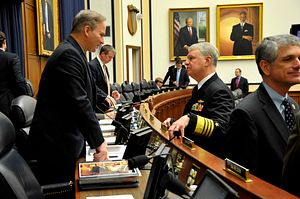Virginia Congressman Randy Forbes was defeated Tuesday night in the Republican primary election for the Virginia’s second Congressional district. Forbes, chairman of the Seapower and Projection Forces Subcommittee of the House Armed Services Committee, has worked hard to develop a strong presence in the defense analyst community, coming out strongly in favor of a more powerful Navy, and of measured military steps to manage the rise of China. Forbes’ office developed a reputation for serving as a greenhouse of conservative defense thought.
The reasons for Forbes’ defeat are complex; a state Supreme Court order forced Virginia to redraw its Congressional districts, putting Forbes in a disadvantageous position for the general election. He decided to seek re-election in the new 2nd District, rather than in his home 4th District, but lost in the primary to retired Navy SEAL Scott Taylor.
Forbes was a hugely important voice for the Navy on Capitol Hill. He published “A Conservative Case for Seapower,” which laid out an argument for why the Republican Party should concentrate its foreign and defense policy around maritime issues. He was generally an advocate for the Littoral Combat Ship, although he also favored heavy scrutiny for the program. He favored AirSea Battle and other projects for ensuring that the services worked effectively together in the Pacific, and argued that the U.S. Army should pursue land-attack cruise missiles as part of a system for controlling the PLAN’s access to the Second Island Chain.
Forbes founded and served on the Congressional China Caucus, a group which focused on the problems associated with the emergence of China as a major world power. The defense and China issues were connected; Forbes believed that strong maritime capabilities were necessary to manage China’s rise in the Western Pacific, and, more generally, its increasing power in Asia. On other issues, Forbes was regarded as quite conservative; he voted against allowing LGBTQ service members from serving openly in the military.
The Virginia electoral landscape generally favors defense wonkery; it includes a disproportionate number of veterans, several major military installations, a huge shipyard, and a close proximity to the broad civilian and military defense communities in Washington, D.C. Forbes’ experience (notwithstanding the idiosyncrasy of the district shift) suggests that expertise in defense issues, no matter how well-honed and carefully crafted, has limited electoral payoffs. And that is deeply unfortunate for the future of our conversation on foreign and defense policy.

































